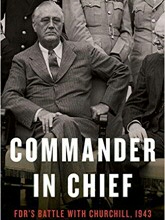Biographer: war won thanks to Roosevelt's military genius

Franklin Delano Roosevelt was the military genius who ensured allied victory in World War II. The war might well have been lost had the former US president not insisted on key strategic choices. Biographer Nigel Hamilton concludes this in his dissertation, a partial biography which focuses on Roosevelt as military commander in chief in the year 1943. Hamilton insists a correction is due: the military leadership of Roosevelt has been grossly underestimated, even by military historians. Hamilton will defend these conclusions April 28nd at the University of Groningen.
Military genius
Military historians have often portrayed ‘FDR’ as a hands-off president in military affairs. His reputation of having been a military lightweight is undeserved and must be corrected. Based on new source material and a series of interviews with the last surviving members of the White House so-called Map Room staff, Hamilton concludes that “the obstinate Dutchman” was a military genius and the true global commander in chief of the Allied powers.
Spent nation
His key military insight was that only American military might could defeat the Wehrmacht. He saw that Britain was a spent nation in 1943, militarily unable and unwilling to attack Nazi Germany. Hamilton: “Roosevelt knew American armies should first learn the life-or-death business of modern war on the “safe” battlefields of North Africa and Sicily.” His commanders recommended an early invasion in northern France. Roosevelt refused. He did not want to play into German hands and risk the loss of the war in a military catastrophe. US generals initially objected to the amphibious invasion of Sicily. Roosevelt persisted: the experience would be valuable for the 1944 Channel landings.
Battle with Churchill
Hamilton shows this strategy led to a ‘battle’ with the British Prime Minister. “Churchill moved might and main to stop Roosevelt and sabotage his strategy.” Twice in 1943, following allied military successes in North Africa and Sicily, Churchill traveled across the Atlantic by ocean liner to Washington to persuade Roosevelt to abandon ‘Overlord’ (the D-Day invasion) altogether, and commit all efforts to the Mediterranean campaigns. Roosevelt refused – “I shall read him the Riot Act” - and threatened to shut the British out of the atomic bomb research if they did not stick to the strategy as agreed upon at the January 1943 Casablanca conference. To Roosevelt the unconditional surrender of Axis powers was a strategic necessity. Not to appease Stalin, but to pursue his own post-war political vision despite Churchill’s understandable reservations.
Partial biography
This study focuses upon FDR in his historic role as U.S. Commander in Chief. “Partial biography” is a new trend in biography today that focuses on a chosen perspective, period or theme in the life of a subject, which is then examined in great depth. This particular “partial biography” focuses on the decisive year 1943 and the military leadership of FDR. It was the year in which the Allied armies turned from defensive to offensive warfare in Europe. The focus and depth of this type of study enable the partial biographer to correct popular myths and too-superficial conclusions drawn in other studies.
Book presentation
Commander in Chief: FDR’s Battle With Churchill, 1943 is first published in Dutch, three months ahead of publication of the English edition in Britain and the United States. The John Adams Institute will organize the presentation of the Dutch translation in the Amstelkerk in Amsterdam (May 2nd).
Curriculum vitae
Nigel Hamilton (1944) is an American citizen but was born in England. His father served as a British commander of the 7th Battalion of the Duke of Wellington’s Regiment, who fought near Nijmegen in 1944 (where he was awarded the Distinguished Service Order in the field) and later liberated Arnhem and its zoo! Nigel Hamilton has previously published major biographies of John F. Kennedy and Bernard Montgomery. His promotors are University of Groningen professors Doeko Bosscher and Hans Renders (Biography Institute).
More information
Hamilton will be in the Netherlands late April and early May. He can be contacted through Hans Renders at the Biography Institute.
More news
-
19 January 2026
Digitization can leave disadvantaged citizens in the lurch
-
13 January 2026
Doing good in complex situations
